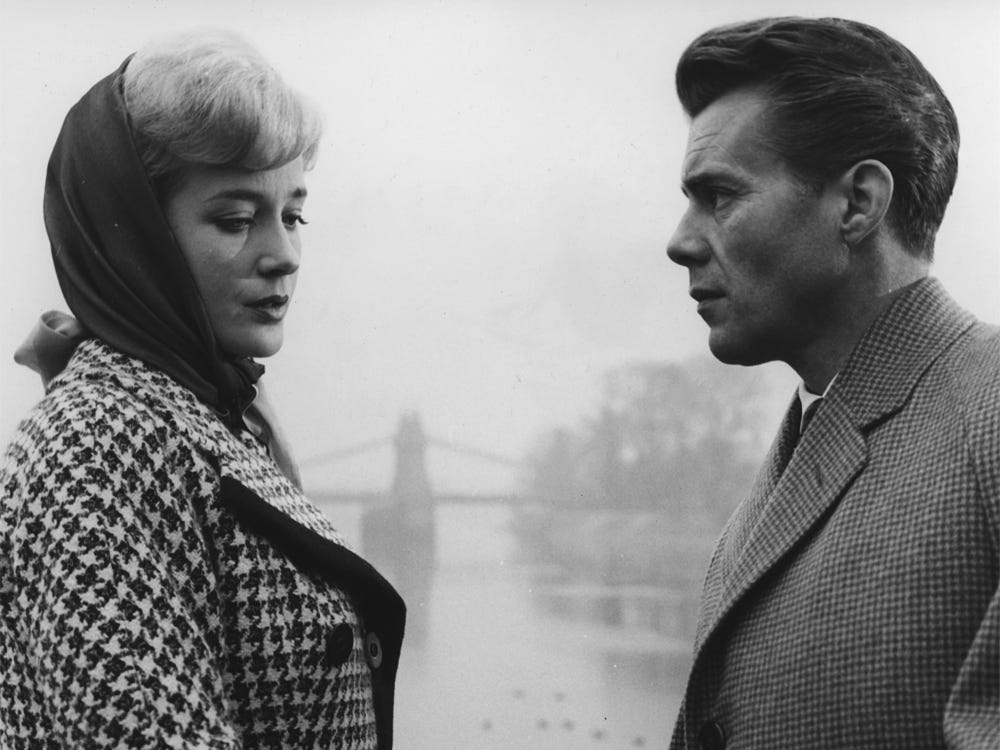At the Movies: Victim (1961)
Revisiting a minor classic
Well, happy June, everyone. ‘Tis the season/month for op-eds, polemics, etc. I have nothing against op-eds and polemics, as you may have noticed. But if you’re like me, you can get tired of all op-eds all the time. I like to think this little Stack has done well partly because I offer a few more flavors. In that spirit, I want to do something a little different this month.
One of my first loves as a writer was film criticism, which I’ve done a little of in recent years, but not as much as I’d like. As this summer finds me taking first steps into the world of screenwriting myself, it seems like a good time to channel my inner Roger Ebert and just talk about some movies. So, for the next few weeks, I thought I might try to do this with a few flicks that treat gay issues/identity/history/etc., in ways that still interest me even when I inevitably disagree with their thesis. I floated this thought on Twitter, and two people thought it was a great idea, so clearly, it’s a great idea. In all seriousness, this may be a bit of a gamble, given the eclectic makeup of my readership. But so far, all of you seem to have your different reasons for liking the stuff I write, and hopefully you will continue to. As always, thank you all for reading!
The first flick I want to pull out of the vault, Victim, was released in 1961, starring Dirk Bogarde and Sylvia Syms. It was the first British film to use the word “homosexual,” and the first non-period piece to make homosexuality a primary theme. The story follows a small ensemble of gay men through London as they’re systematically targeted by a blackmail ring, in a world where homosexual practice is a criminal offense. Protagonist Mel Farr, a married but closeted lawyer, faces a classic moral dilemma when an old emotional affair comes back to haunt him in a fanboy’s suicide. Will he look the other way, or will he risk everything to bring the villains to justice?
From this simple but compelling premise, the picture unfolds as a message movie wrapped in a slick neo-noir thriller. At the time, homosexuality was still too taboo for Hollywood, but in England, it was just becoming ripe for dramatic treatment as a “social problem.” In 1957, several high-profile indecency trials had catalyzed the Wolfenden Report—a lengthy document arguing that while homosexuality was a tragic and abnormal condition, adult men shouldn’t be liable for private, consensual acts with each other. Filmmakers Basil Dearden and Michael Relph judged that a story carefully crafted around this focused thesis could sway public opinion and ultimately change the law. Within the decade, their hunch would prove correct, and the film would be directly credited as an influence on the Sexual Offences Act. But ironically, its very success would cement its status as a dated work. By 1979, Dirk Bogarde was already reflecting that “in this over-permissive age,” it was strange to look back and think that such a “modest” film could ever have been considered “courageous, daring, or dangerous” — particularly since his own character never even commits an offense. Yet, for its time, he thought it was all three.
Forty-five more years later, it feels like ancient history, for trads and progressives alike. The progressive can dismiss its special pleading as an exercise in soft bigotry. The traditionalist can laugh at its tired old liberal clichés about “what consenting adults do in their bedrooms” as the BDSM Pride float sails by. In 2023, can anything of timeless value still be gleaned from such a timebound bit of cinema? Obviously, I think so, or else I wouldn’t be writing this review.



